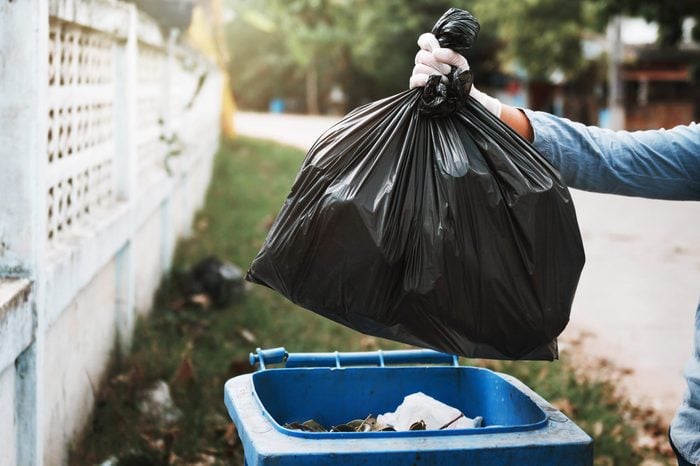
Items to never throw in the garbage
Many of us don’t give too much thought to what we put in the trash. Sure, we know we need to sort the recyclable items separately, but aside from that, we often lump everything else together and don’t consider the other items that need to be handled with special care. But if we want to keep our planet healthy and ourselves safe, this is essential. So, take note: These are the items you should never throw in the garbage.
Reader’s Digest spoke with several experts to pinpoint the worst objects for your bin, including Wade Scheel, the director of governmental affairs for Stericycle Environmental Solutions and Chris Batterson, the key account manager of construction and projects at Rubicon. From batteries and electronics to tires and paint, you’d be surprised by the items experts say shouldn’t be in your trash.
So, keep reading to find out the 13 things you should never throw in the garbage, ever—and why! But first, a few expert-approved tips:
Get Reader’s Digest’s Read Up newsletter for more recycling tips, fun facts, humor, cleaning, travel and tech all week long.
About the experts
|
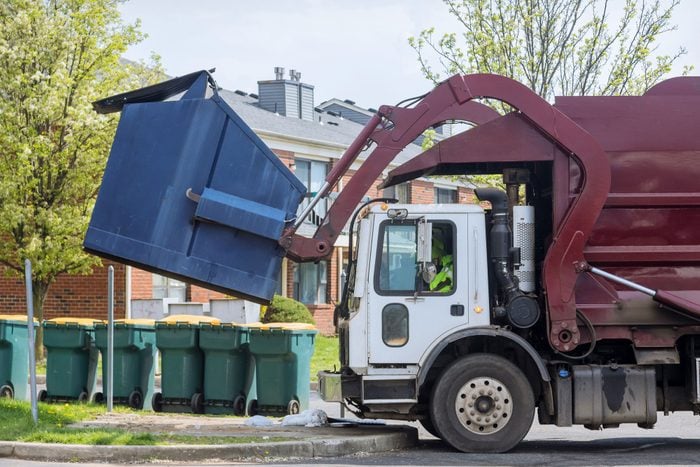
Review the laws and local rules
Specific guidelines on what you can and cannot put in household trash often depend on local and state laws, along with the policies of your particular trash company. There are also federal laws that regulate some prohibited items. The most common restrictions relate to items that are flammable, contain hazardous substances or pose a danger to people or the environment.
“The worst things to throw in the trash are items that fall under the classification of Household Hazardous Waste (HHW),” says Scheel. “The U.S. Environmental Protection Agency (EPA) classifies these items as leftover household products that can catch fire, react or explode under certain circumstances, or that are corrosive or toxic.”
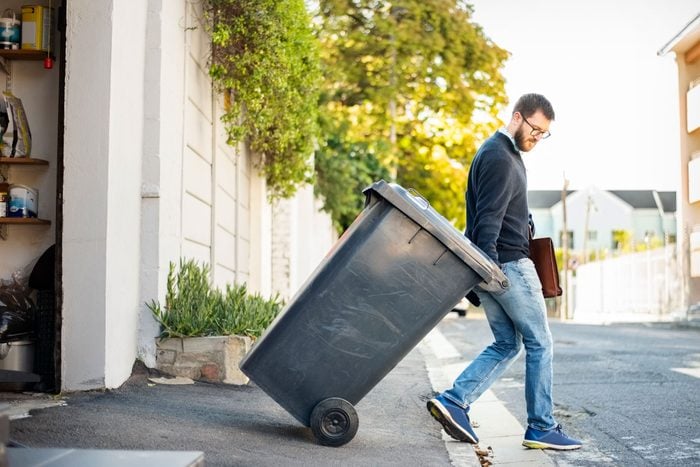
Make safety a priority
Just because you use something in your daily life, it doesn’t mean that it isn’t dangerous once you discard it. “When not properly disposed of, these substances can leach into the environment,” explains Scheel. “Once this happens, these chemicals have the potential to harm humans, plants and animals, as the toxins contaminate things like the air, ground and even our drinking water.”
Certain items can also be dangerous to anyone who handles them or is in the nearby vicinity if an incident occurs. Residents are advised to check with their local municipality or county for proper disposal options when dealing with explosives, radioactive materials, flammable and combustible substances and poisons.
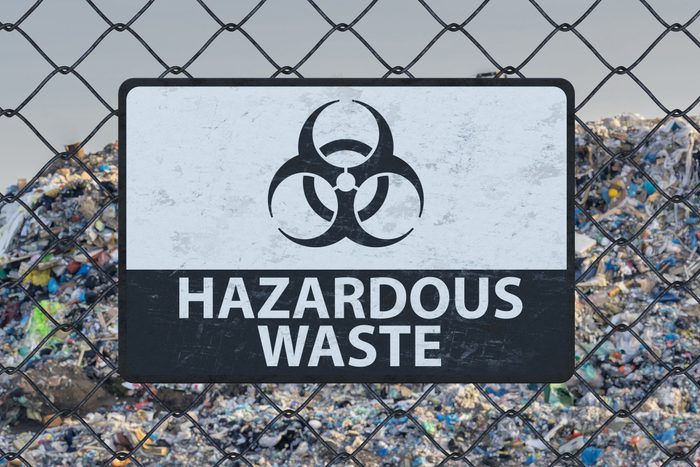
Have a plan for proper item disposal
We live in a country that produces a lot of waste—and subsequently has a lot of waste to manage. Even if each household has just a few items of concern, that can quickly add up. “The average household generates more than 20 pounds of household hazardous waste a year, and Americans generate 1.6 million tons of household hazardous waste a year, meaning it is necessary for consumers to have a plan in place for how to dispose of these items,” says Scheel. “The proper way to dispose of items that should not be thrown in the trash is to either schedule a home-pickup service or locate a local drop-off facility or event that will properly dispose of that waste for you.”
It’s also a good idea to be proactive, thinking about the environmental impact and disposal considerations of certain items before you buy them. “According to the EPA, the best way to avoid the risks associated with household hazardous wastes is to properly monitor the use, storage and disposal of products that contain potentially hazardous substances,” says Scheel. “While it is impractical to completely avoid buying household products that contain zero potentially hazardous chemicals, consumers can reduce the negative impacts these substances have on the environment by educating themselves on which items cannot be easily thrown away in the garbage and how to properly dispose of these items.”
So, what items should never go in the garbage? Read on to find out.
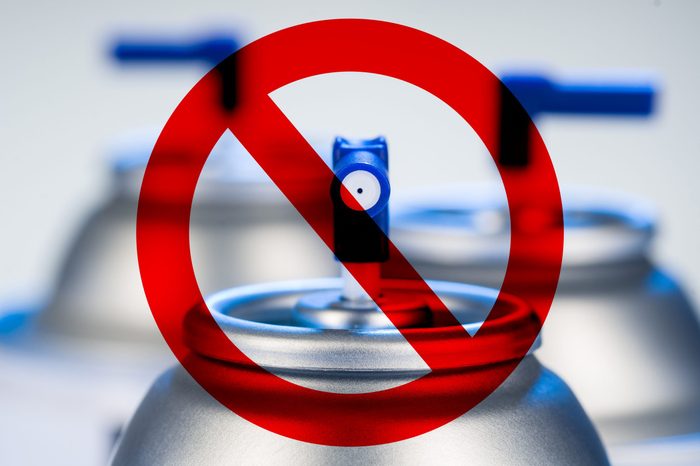
Aerosol cans
The problem with an aerosol can isn’t the can itself—it’s what might be inside of it. There could be chemicals or propellants still in there, which could cause it to explode inside of a trash compactor. If you’ve completely emptied all of the contents from the can, you may be able to recycle it. (Check with your local recycling service or waste-collection agency.) And an important FYI: Never try to pierce an aerosol can—to get rid of its contents or for any other reason—as this can be very dangerous.
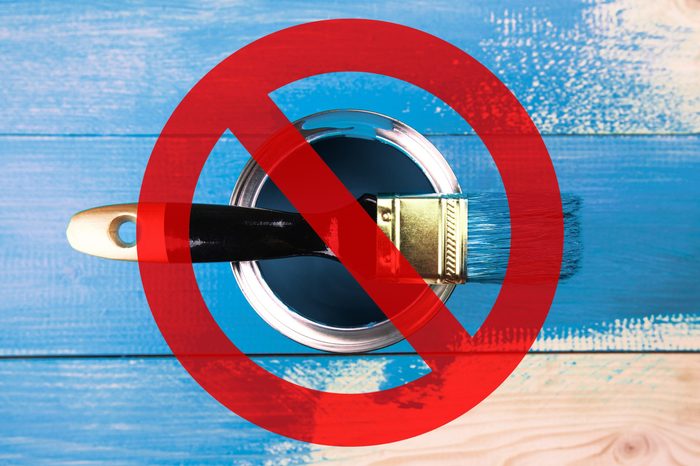
Paint
“Disposing of paint improperly by tossing it in the trash can be harmful to the environment due to the chemicals and toxins within it that can damage both the land and air,” Batterson says. “Unused or discarded paint can usually be dropped off at participating local paint suppliers, as well as at community non-profit organizations. Local municipalities will be sure to have guidelines for bringing it to your local facility.” You may also have a service like PaintCare in your area, where you can drop off unwanted paint for disposal.
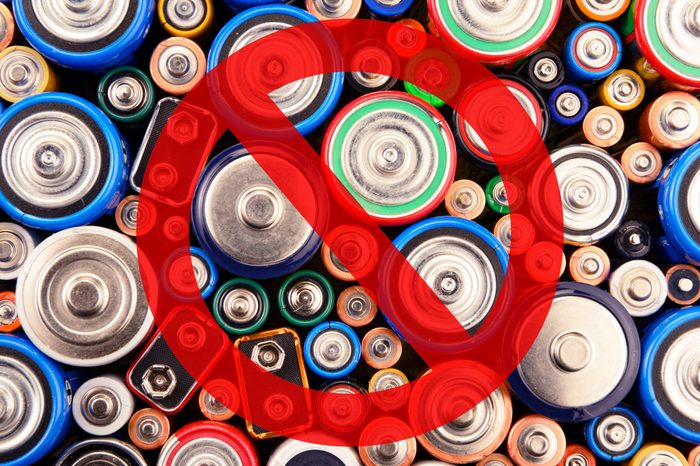
Batteries
We use batteries for all sorts of things, which means we eventually end up with a big collection of dead batteries that need to be discarded. But think before you throw them in along with the rest of your unwanted stuff. “Rechargeable batteries are great initially, but when the cycle finally ends, the metals used to make them, including cobalt and lead, can be harmful to the Earth if disposed of improperly,” says Batterson. “Today, batteries can be dropped off not only at local municipal sites, but some retailers now offer in-store recycling boxes to ensure that batteries are recycled properly.”
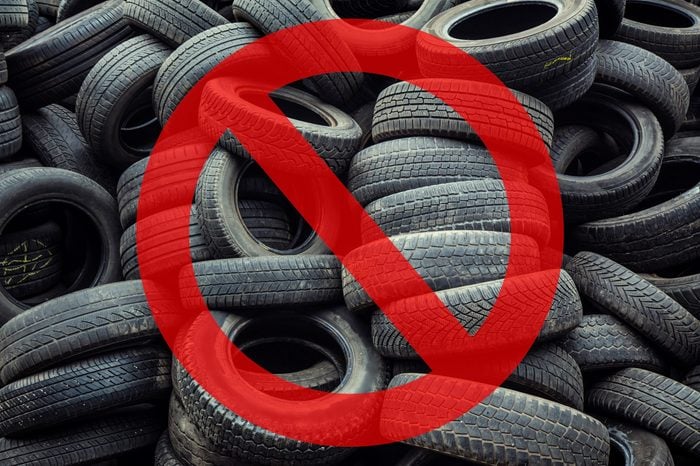
Tires
Tires are other items you should never throw in the garbage. They can have a whole new life when they’re recycled and ultimately reused. “It is important to recycle tires, as there are outlets for them after they’ve fulfilled their initial intended use on a vehicle,” says Meredith Leahy, the waste diversion manager for circular solutions at Rubicon. “Tires can be used for tire-derived fuel, which can be used to help run different types of facilities. They can also be used as a tire-derived aggregate, which can be used for backfill in construction projects or components in road-stabilization projects. And ground rubber from tires can be used in different landscaping projects, rubberized asphalt and other rubber products.”
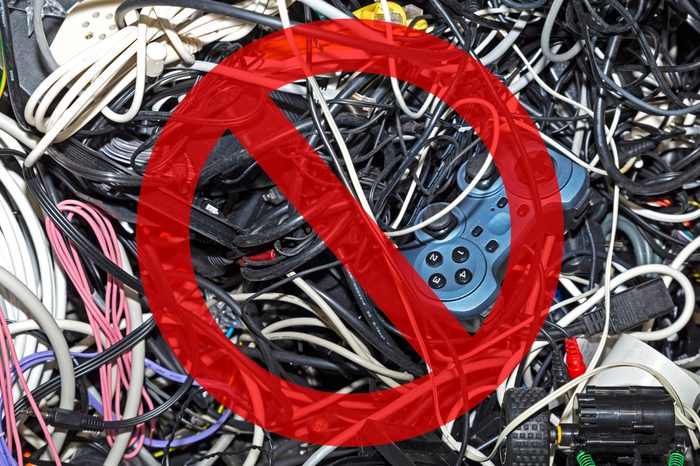
Electronics
Of course, electronic devices make our lives easier, and we tend to have a lot of them in our homes (probably more than you even realize). But they also present a particular challenge when they outlive their usefulness. “Electronic waste or e-waste needs to be handled by a certified vendor to ensure both safe recycling and destruction of electronics, as well as the security of the information on these machines,” says Leahy. “Most municipalities will have designated e-waste drop-off locations. Businesses with more of a bulk drop-off can rely on a network of specialized vendors and facilities with the proper certifications to handle and ensure recycling of the material.”
Some electronics stores also will dispose of certain items for a small fee—or give you cash or a discount on a new product.
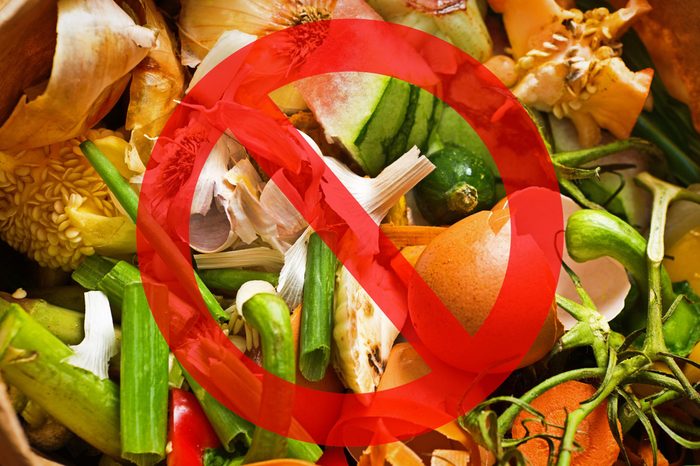
Food scraps
Wait—what? Doesn’t everyone throw old food in the trash? Yes…but experts note that food scraps are items you should never throw in the garbage—or at least not so much of it. Food scraps make up a significant portion of many households’ trash output and end up posing problems for the environment. “Food scraps should not be sent to the landfill, because in that environment, they generate methane, which is a potent greenhouse gas,” says Ryan Cooper, the waste diversion manager and organics recycling lead at Rubicon. “These materials should be diverted from the landfill and converted into valuable resources such as animal feed, renewable natural gas, fuel, electricity and compost.”
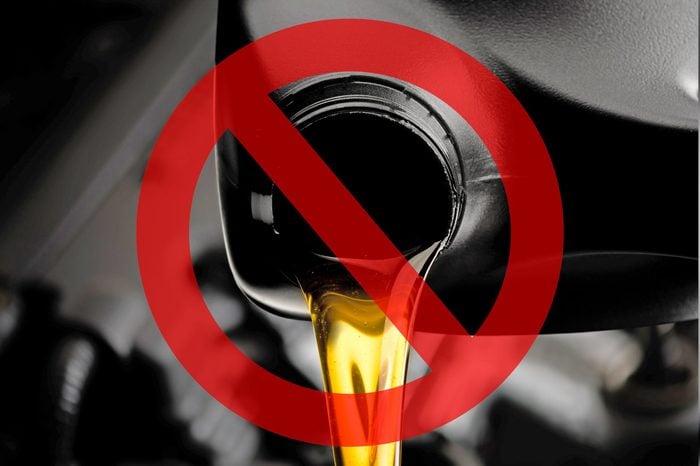
Motor oil
“Motor oil shouldn’t be placed into the regular trash, as doing so could cause it to leak into the groundwater,” says Leahy. You also never want to dump it down a drain or sewer because it can block or damage pipes. So, what should you do with it? “Many automotive parts or repair shops that sell motor oil will often take it back for recycling. You will need to inquire at each store before visiting one of these shops,” she says. You can also check with your county. Many solid-waste offices offer motor oil recycling programs, but this varies, so call for details in your area.
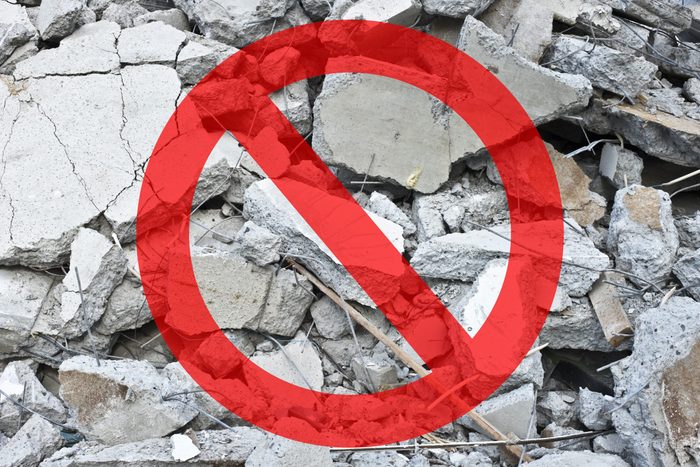
Construction debris
Concrete is one of the toughest materials to dispose of…but one of the easiest to recycle. And that’s a good thing because there’s an awful lot of it out there. “Concrete is quite possibly the single easiest material to find a recycling home for, and the life span of recycled concrete can fall into the hundreds of years,” says Batterson. “The EPA estimates that the amount of C&D debris generated is more than double the amount of standard solid waste. Finding alternative outlets for materials for reuse, repurposing or recycling is even more critical in this space to have the greatest impact on reducing the overall amount of landfill space in use.”
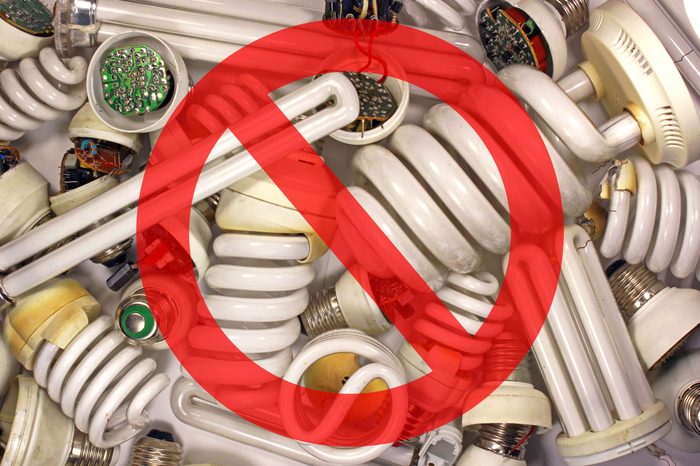
Fluorescent light bulbs
The chemicals in fluorescent light bulbs can be harmful. This is why you should follow a careful process to clean up any bulbs that smash or break. “Fluorescent light bulbs can contain harmful dust and vapor, such as mercury, [so it’s a big problem] if these bulbs are simply thrown in the trash and break,” says Batterson. “Many communities and manufacturers offer mail-back programs where you receive a cardboard box to load the bulbs into and mail to a vendor for proper recycling.”
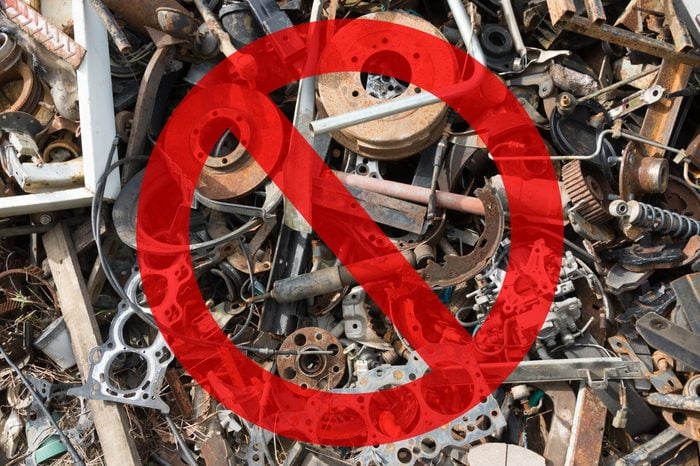
Automotive parts
Automotive parts may contain hazardous pieces or harmful chemicals—but there’s also the fact that you could be throwing money away. “Automotive parts should always be looked at for recycling first before throwing them away in the trash,” says Leahy. “Many automotive parts are made of valuable metal that some area scrap-metal dealers would be able to accept for recycling.”
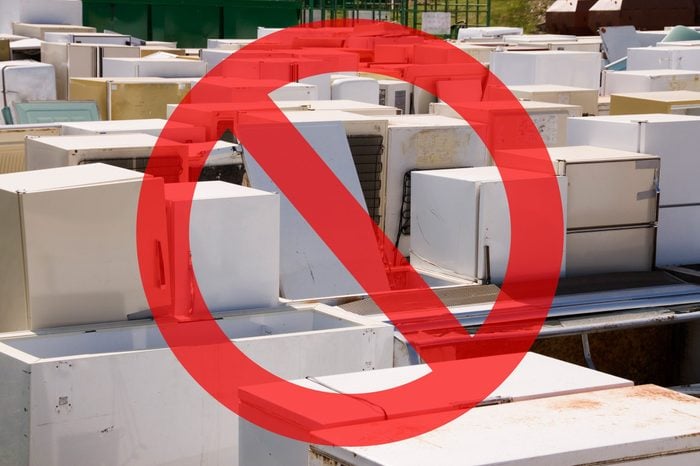
Large appliances
“Large appliances have a host of parts and components that can have a second life in other devices and appliances, as opposed to just sitting in a landfill to rot away and be harmful to the environment,” says Batterson. “Additionally, appliances can be recycled through metal shredding once any fluids—such as refrigerants and oils—are properly drained and any e-waste components are removed.”
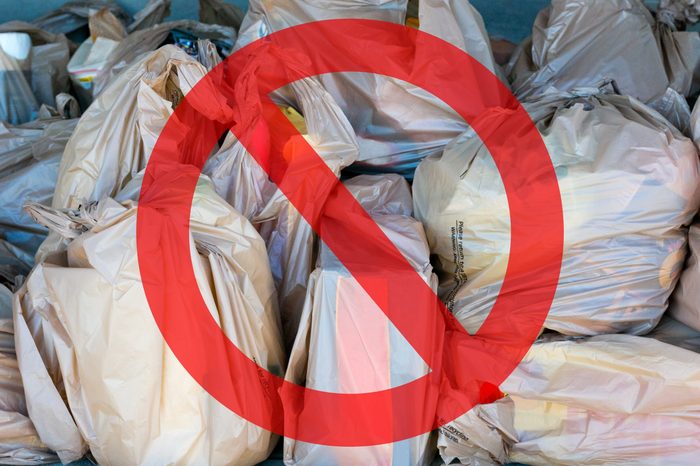
Plastic bags and film-type packaging
By now, we all know that plastic bags are bad for the environment, leading some of us to replace them with reusable shopping bags. So it’s a good idea to get rid of them, right? Only if you’re disposing of them correctly. “Plastic bags can get stuck in waterways, hang on trees and litter our streets,” says Leahy. “Clean, dry plastic bags and films, such as those found at the grocery store or what your newspaper comes in, can be taken to local grocery stores and other retail locations for recycling.”
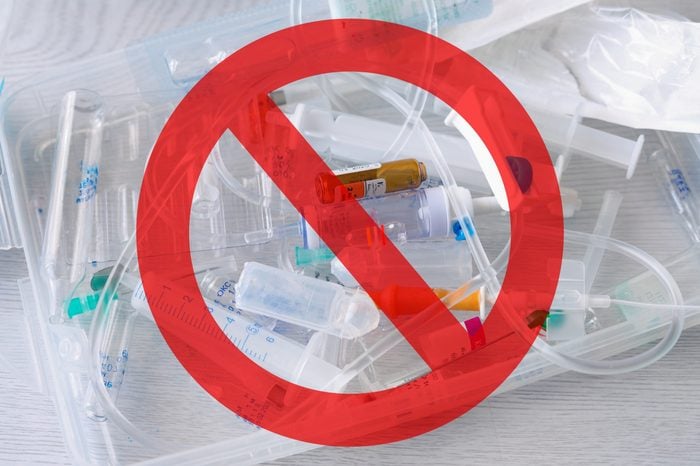
Medical waste
Medical waste can include insulin syringes, specimens and the containers that store them, and sheets or other fabrics that may be contaminated. “This special type of hazardous waste needs to be handled safely, as it can contain liquids or sharp items that could pose a threat to human health or the environment,” says Leahy. “The best move here is to contact your local county’s solid waste office to learn the best way to dispose of these types of materials in your area.”
Why trust us
At Reader’s Digest, we’re committed to producing high-quality content by writers with expertise and experience in their field in consultation with relevant, qualified experts. We rely on reputable primary sources, including government and professional organizations and academic institutions as well as our writers’ personal experience where appropriate. For this piece on what not to throw in the garbage, we spoke with various experts, including Wade Scheel, the director of governmental affairs for Stericycle Environmental Solutions and multiple professionals at Rubicon, a software platform that provides full-service waste management, recycling and smart city technology solutions. We verify all facts and data, back them with credible sourcing, and revisit them over time to ensure they remain accurate and up to date. Read more about our team, our contributors and our editorial policies.
Sources:
- Wade Scheel, director of governmental affairs for Stericycle Environmental Solutions.
- Chris Batterson, key account manager of construction and projects at Rubicon.
- Meredith Leahy, waste diversion manager for circular solutions at Rubicon.
- Ryan Cooper, waste diversion manager and organics recycling lead at Rubicon.
- Environmental Protection Agency (EPA): “Household Hazardous Waste (HHW)”
- EHSO: “What is Household Hazardous Waste”
- Hazman: “What is HHW (Household Hazardous Waste)?”
